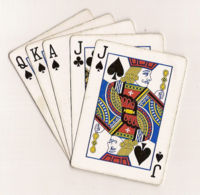Loo (card game)
| The Game of Pam | |
|
"Mouche" - Four of a suit plus Pam ♣
|
|
| Origin | France |
|---|---|
| Alternative names | Loo |
| Type | Trick-taking |
| Players | 3 to 8 (5 to 7 best) |
| Cards | 52 |
| Deck | French |
| Play | Clockwise |
| Card rank (highest to lowest) | J♣ A K Q 10... |
| Related games | |
| Euchre, Rams | |
Lanterloo or Loo is a 17th-century trick taking game of the Trump family of which many varieties are recorded. It belongs to a line of card games whose members include Nap, Euchre, Rams, Mao, Hombre, and Spoil Five. It is considered a modification of the game of "All Fours", another English game possibly of Dutch origin, in which the players replenish their hands after each round by drawing each fresh new card from the pack.
Under various spellings, like the French forms Lenterne, Lenturlu, Looterlu, (meaning "fiddlesticks", a meaningless word equivalent to "Lullay", or "Lulloo", used in Lullabies), the game is supposed to have reached England from France most probably with the restoration of the monarchy in 1660. Also called Langtrillo in its prime form and later simply Loo (also termed Lant in the north of England by 1860, most possibly for having evolved into a more elaborate form of play by the addition of new rules, it may also have been brought to England from Holland. Whichever way it may have been, by the turn of the eighteenth century it was already England's most popular card game. It was considered a great pastime by the idle rich of that time, but it got a very bad reputation as a potentially vicious "tavern" gambling game during the nineteenth century. In the 1875 novel, The Way We Live Now by Anthony Trollope, chapter 24 has an episode wherein a recurring character, with a bad reputation for paying his gambling losses with IOUs and never redeeming them with money, makes a point of winning back his IOUs, one night, by persuading his companions to play Loo with him both playing and dealing, during which he cheats repeatedly by hiding cards up his sleeve, which is possible because the entire deck is not dealt out but cards remain with the dealer.
Oxford English Dictionary quotes a 1685 reference to "Pam at Lanterloo", and Chatto quotes a Dutch political pamphlet of about 1648 entitled Het herstelde Verkeer-bert verbetert in een Lanterluy-spel, containing a dialogue equating the game Labate (hence French Triomphe became La Bête, "The Beast", in Cotton's Complete Gamester) with Lanterluy. This was the very first mentioning of the game.
...
Wikipedia

